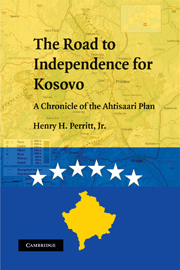Book contents
- Frontmatter
- Contents
- Acknowledgments
- Introduction
- 1 Riots in Kosovo
- 2 Albanian Resentment Comes to a Boil
- 3 Armed Conflict Grows
- 4 Cease-Fire Breaks Down
- 5 Establishing the United Nations' First Colony
- 6 Living Under a Colonial Regime
- 7 Responding to the Wake-Up Call
- 8 The Politics of Purgatory
- 9 Enter Martti Ahtisaari
- 10 The Stage for Final Status
- 11 “Practical” Negotiations
- 12 Negotiations over Status Itself
- 13 The Ahtisaari Plan
- 14 The Plan Runs into Trouble
- 15 The Troika Takes Over
- 16 Independence Day
- 17 Kosovo's Future
- 18 Implications for the International Order
- Glossary of Acronyms
- Bibliography
- Index
- References
6 - Living Under a Colonial Regime
Published online by Cambridge University Press: 22 January 2010
- Frontmatter
- Contents
- Acknowledgments
- Introduction
- 1 Riots in Kosovo
- 2 Albanian Resentment Comes to a Boil
- 3 Armed Conflict Grows
- 4 Cease-Fire Breaks Down
- 5 Establishing the United Nations' First Colony
- 6 Living Under a Colonial Regime
- 7 Responding to the Wake-Up Call
- 8 The Politics of Purgatory
- 9 Enter Martti Ahtisaari
- 10 The Stage for Final Status
- 11 “Practical” Negotiations
- 12 Negotiations over Status Itself
- 13 The Ahtisaari Plan
- 14 The Plan Runs into Trouble
- 15 The Troika Takes Over
- 16 Independence Day
- 17 Kosovo's Future
- 18 Implications for the International Order
- Glossary of Acronyms
- Bibliography
- Index
- References
Summary
By the start of 2000, UNMIK had established itself more firmly and begun issuing legislative acts in the form of “UNMIK Regulations.” An interim administrative council that included Thaçi, Rugova, and other political party leaders provided an indigenous locus for shared governmental authority with UNMIK. UNMIK promulgated a “constitutional framework” that provided for power sharing with newly minted, local Provisional Institutions of Self-Government (PISG). UNMIK retained ultimate decision-making authority, however.
Resolution 1244 directed the Secretary General to devolve power to locally elected institutions and to oversee a process for determining the final status of Kosovo. The constitutional framework was a natural step under these authorities. It did not create Kosovar Albanian political institutions from the dust; it delegated some of the executive and legislative power given to the Secretary General by the Security Council and delegated by him to the Special Representative of the Secretary General (SRSG). Nevertheless, the constitutional framework was quite controversial because it created popularly accountable political institutions in Kosovo that were independent of the political authorities in Belgrade – a clear step toward eventual independence for Kosovo.
Two quite different interpretations of Resolution 1244 bedeviled UNMIK from the beginning. The first interpretation, embraced by the Kosovar Albanians and the Americans, envisioned UNMIK as a political trusteeship intended to nurture the peoples of Kosovo and their democratically elected leaders in developing their own distinct political entity.
- Type
- Chapter
- Information
- The Road to Independence for KosovoA Chronicle of the Ahtisaari Plan, pp. 63 - 78Publisher: Cambridge University PressPrint publication year: 2009



